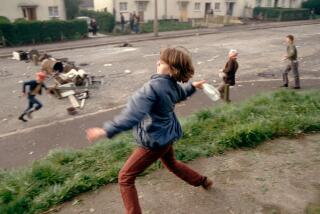New ‘Inferno’ translation weds Irish, Italian souls
- Share via
It is a mark of our culture’s self-imposed poverty that, these days, the classics are seldom taught and hardly read.
Every now and again, a superstar translator manages to break through to the bestseller lists, as Seamus Heaney did two years ago with his stunning “Beowulf” or as the late Ted Hughes once did in Britain with his wonderful Ovid.
If there were justice in our taste and buying habits, their books would soon be joined by the Irish poet and novelist Ciaran Carson’s new translation of Dante Alighieri’s “The Inferno.” Recently published in Britain and Ireland, it is forthcoming here next month from Granta Books. Rendered in what one British critic called “a vivid Hiberno-English idiom,” this is a Dante not for the shelf but for the eye and voice -- addictively readable, virtually demanding to be recited aloud.
As Carson’s colleague and countryman Paul Muldoon puts it, this is “quite simply the best version of Dante there is, the only one with a more than passable stab at terza rima” -- the rhyme scheme of the original.
Still, the odds are long against even so compelling a rendering finding the audience it deserves. That’s a melancholy fact, because the last half-century has been a golden age of poetic translation, an era in which the common currency of English has made possible the globalization of ancient and modern literature.
Some of the examples that come most immediately to mind are Richard Lattimore’s translations from the Greek; Kenneth Rexroth’s renderings from the Japanese and Chinese; W.S. Merwin and Clarence Brown’s translations of the Russian Osip Mandelstam; the collaborations of Robert Hass, Robert Pinsky and Lillian Vallee with the Polish writer Czeslaw Milosz; Stanley Kunitz and Max Hayward’s unmatched Anna Akhmatova; and Thomas Kinsella’s translations from the Irish, particularly “The Cattle Raid of Cooley,” a European epic older than “Beowulf.”
This is by no means an exhaustive list, but what these examples have in common is the way in which the sensibility and poetic inclinations of the translator fall uniquely in sync with that of their subject.
Unlikely as it seems, that is precisely what has occurred between the 54-year-old Belfast-born Carson and the wandering Florentine, who turned his painful and resentful exile into a “Divine Comedy” in three books, “Inferno,” “Purgatorio” and “Paradiso.”
As the author of eight books of poetry and five works of prose, including the widely praised novel “Shamrock Tea,” Carson came late to Dante. He translated his first Canto, XXXI, just two years go, and as he began work on the other 33 he was aware he was entering a crowded field. In recent years, there has been a surprising number of first-rate Dante translations, including the free-verse version of Robert and Jean Hollander, Allen Mandelbaum’s scholarly rendering and an elegant translation by Pinsky, the former U.S. poet laureate.
Each, to Carson’s mind, had something lacking. “I read through bags of them,” he said Tuesday. “I found most of it earnest but very dull. You hope for a spark, but they’re rare. My own Italian was not fantastic starting off, but I got the feeling of the original and it was sparky -- half obscene in places and angry all over. It flowed. It sang to me, and I wanted that sense of urgency to be there in the English.
“I wanted something that could be read in one go. That’s the way it really works.”
Carson said he also drew on his experience as an Irish Catholic born and living in Belfast, a city whose sectarian divisions mirror in many ways the strife between Guelph and Ghibelline and ultimately forced Dante into exile from medieval Florence. “As I worked,” he said, “I had in my mind’s eye North Belfast, where I live near the old waterworks. I’d see the city’s no-go zones and tattered flags, the blackened side-streets, cul-de-sacs and bits of wasteland stitched together by dividing walls, like Florence.
“I live here in my native city as an exile in a sense. When you don’t share the state’s ideology -- as I don’t and Dante didn’t -- you’re in exile and language is your path back.”
Irish was Carson’s first language and that, too, he said, informs his translation, as it has -- he points out -- Heaney’s work. “We don’t consider English finally as our own language. When we write in English, it’s always with an edge that makes a place for Irishness, a sense that there’s another way into the thing, no single manner of speech.”
When it came to Dante, Carson said, it was that distance that allowed him to appreciate the “learned allusions and the earthy vigor. I approached him with respect but not awe. Here’s a man, I thought, going through things not unlike what goes on here in Ireland, who did his job as a poet really well. It’s good stuff and it’s alive for us now.”
An authority on Irish music, Carson also found himself in thrall to Dante’s melodious Italian, which is why he resolved that the Hiberno-English ballad would be the model for his verse translation. “There are songs in both the English and Irish language that move between formal art and the street, as Dante’s Italian does,” he explained.
“At the back of my mind in every line I wrote in this work, I could hear a song. It was there for me like a long, ongoing ballad, a song full of yearning and despair and, at the end, hope.”
*
While Kunitz was at work on his great Akhmatova translations, the Russian poet Andrei Voznesensky -- who, as a very young man, had known Boris Pasternak -- told his American colleague this story:
Pasternak was once rebuked by a pedant, who came to his door bearing a long list of the poet’s mistakes in translating Hamlet. The complaint was greeted with laughter and a shrug: “What difference does it make? Shakespeare and I -- we’re both geniuses, aren’t we?”
To this day, Pasternak’s Hamlet is regarded as one of the jewels of Russian literature.
Genius is what so many of this era’s great translations have in common, though the best also have, as Carson puts it, “a little luck and a lot of cheek.” And thus these lines of his “Inferno’s” final verse, in which all hell gives way to hope:
we climbed and climbed until we caught a sight,
beyond a rounded opening, of store
on store of things of Heavenly delight;
and we emerged to see the stars once more.
*
Canto V translations:
Here are the opening verses of Canto V of Dante’s “The Inferno,” translated by:
Ciaran Carson
So I descended from the First into
the tighter Second Circle: here, less space
but greater pain, so louder screams ensue.
Minos the terrible, with grinning face,
squats on the threshold; here he tries the crime,
and girds himself according to each case.
Robert Pinsky
So I descended from first to second circle --
Which girdles a smaller space and greater pain,
Which spurs more lamentation. Minos the dreadful
Snarls at the gate. He examines each one’s sin,
Judging and disposing as he curls his tail:
That is, when an ill-gotten soul comes down
Allen Mandelbaum
So I descended from the first enclosure
down to the second circle, that which girdles
less space but grief more great, that goads to weep
There dreadful Minos stands, gnashing his teeth
examining the sins of those who enter,
he judges and assigns as his tail twines
More to Read
Sign up for our Book Club newsletter
Get the latest news, events and more from the Los Angeles Times Book Club, and help us get L.A. reading and talking.
You may occasionally receive promotional content from the Los Angeles Times.










